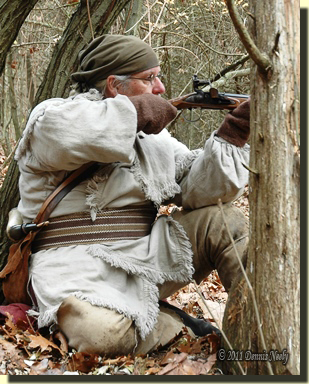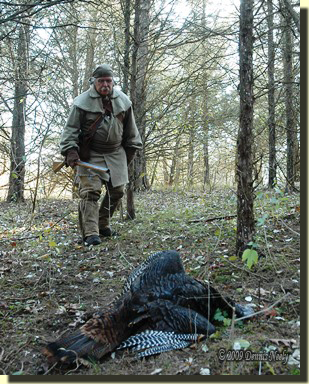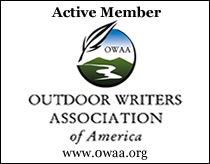Darkness afforded safe passage. Slow and steady, elk moccasins still-hunted along an earthen byway. Warm fog smelled drizzly wet. Silver orbs clung to thin prairie grass. Hunt-stained buckskin leggins dashed the dew from the slender, green blades. Some droplets spattered, some clung, damping leather knee-high. The year was 1792, early May.
Beyond the small clearing, the doe trail eased over the ridge crest and down into the thick cedar trees. Boughs brushed the hired hunter’s faded-green sleeves, darkening the fabric with water spots. Six or so cedars down the hill, the elk moccasins paused.
Trepidation replaced the urgency of reaching the fallen tangle of cedars before first light. A premonition swept over the post hunter like the cold that befalls the earth just before a mighty thunderstorm. Without conscious thought, the forest tenant treed. His blanket roll, pulled from about his shoulders, dropped beside a modest cedar. The butcher knife sliced away a half-dozen scraggly, dead twigs. He sat cross-legged, his left shoulder against the trunk, the Northwest trade gun resting on his left knee, which was raised up ready for an impending shot.

Twenty silent minutes passed. The sky grayed. A doe meandered south to north on the lowest trail that followed the great swamp’s west cut bank. Then a single gobble, abrupt and short, gave validity to the premonition… “Obl-obl-obl-obl!”
The bird called from the roost, maybe sixty paces north, about even with where the woodsman sat. The smoothbore’s turtle sight stalked in the gobbler’s direction. “A clean kill, or a clean miss. Your will, O Lord,” the eager hunter whispered.
Big wings thrashed; the muffled “thump” hit close by, distinct, certain. From experience, the woodsman worked the trigger as he brought the firelock’s cock to full attention. The death bees twittered. The left elbow anchored on the left knee. In less than a minute the long-bearded tom’s red head and white pate marched south on the next lower doe trail. Thirty-five paces…behind a young oak trunk…thirty…a pause in front of three cedars that shared the same root…not quite twenty-five…the turtle sight followed the red head’s progress…
A Problematic Quick Kill
The journal entry for that spring turkey hunt is quite short and choppy, not more than ten brief sentences with two or three word phrases that are important to me as a writer. In that era, the gobblers roosted in the same trees each night, a hundred or so yards down the ridge. A February ice storm tipped seven or eight good-sized cedar trees upon each other, creating Mother Nature’s version of the half-faced shelter.
The destruction was new, and on that May morning my alter ego wanted to lure a fresh turkey dinner with a few seductive draws on the wing bone. But then the premonition hit. Sometimes he listens to that inner voice, but most times he doesn’t. That morning, the voice was loud and specific, “Sit Now!” And so he did as instructed.
From the lone gobble to the shot took no more than a few minutes. There was no cautious stalk, no forest chase, no intrigue and no story, to speak of. “A turkey gobbled, flew down, walked a few paces and the Northwest gun belched fire.” Not much for excitement there, let alone a riveting exploit, modern or traditional.
Now I need to back up a bit. I feel it is important to note that I did not finish the story, but I had to give away the ending to make sense of my thoughts and comments. Please, let me explain.
Early on in my traditional hunting writings, I split the story up, explaining the importance of that particular tale, then finishing with the “Kla-whoosh-BOOM!” Now and then the beginning of a tale contained a muzzle blast, but those were misses. At the time, this format was not by design.
Then a good family friend stopped me at the grocery store to tell me how much she enjoyed my writings. She said she was a non-hunter. Her husband encouraged her to “read one or two,” so she relented. Sherry said she discovered that if the “Kla-whoosh-BOOM!” occurred in the main text body she could keep reading, knowing that I missed. When the trade gun’s bellow was close to the end, she stopped reading. She was happy, and I gained a new reader.
After that impromptu discussion, I’ve followed that convention with only two exceptions. So I have to disclose…there is a “Kla-whoosh-BOOM!” near the end of this missive.
Experienced hunters know that there are times when circumstances nullify all the cultivation of skills and hours of intense woodland training. These happenings are few and far between, at least for my characters, but they do happen.
For me, as a living historian, “The turkey gobbled, flew down…BANG!” situations are counter-productive to a meaningful portrayal within a somewhat planned traditional hunting simulation. But, they are still period-correct.
Yes, a major reason for crossing time’s threshold and pursuing wild game in the manner of my hunter heroes is the taking of sustenance for the family dinner table. But more often than not, that is not the case. And when that happens, the simulation, the living of life in the shadow of Meshach Browning, George Nelson, John Tanner or James Smith, is as important as taking a woodland foray to its natural conclusion—providing meat.
From a writer’s perspective, those few thoughts, scribbled on a folded page with a brass lead holder, can form the basis of an enlightening message. But the better tale is what happened the hour or the day or the week before. The failures, the almosts, the twists of fate that are beyond a backcountry hunter’s control provide the best intrigue and realism.
The journals and narratives of my hunter heroes contain passages of game taken more by luck and being at “the right place” than skill. John Tanner, the Falcon, happened upon a young “Assinneboin” hunter on a large prairie. Tanner considers the incident noteworthy and elaborates. In the midst of the telling, he says:
“…I remained a little while at the lodge of the young man I had found in the prairie, and then went out to start for the next village. Geese were flying over, and I raised my gun and shot one. It fell in the midst of a number of Assinneboins. Seeing there a very old and miserable looking man, I motioned to him to go and get it…He then went and took up the goose, and returning, communicated to me by signs which I had no difficulty to understand, that I must go to his lodge and eat with him before I could leave the village…” (Tanner, 135).
The importance of the tale centers on the encounter with the young Assinneboin hunter and the hospitality of his village. The goose is key to Tanner’s interaction with the old man, but the hunting story is a one-liner: “Geese were flying over, and I raised my gun and shot one.”
“You don’t kill much with your trade gun, do you?” That question is common at the outdoor shows, in emails and sometimes in casual conversations. In today’s world, most published outdoor stories tell of taking whatever game the writer decides to pursue. In many instances, the animal is record-book size or the take is the limit allowed under modern game regulations for that specie and location.
Over four decades, “Old Turkey Feathers” has downed a lot of game. But not all of those traditional black powder hunting experiences make it to print. And in the last ten years or so, I have become selective in what I take or shoot at. That’s due in part to past experience and in part to a change in outlook—the seasoning of a sportsman, so to speak.

In truth, I get greater joy in helping others get started enjoying the outdoors, and especially traditional hunting, than stacking up my own game. For me, recounting the 18th-century sojourns is all about delivering an uplifting woodland message, than emphasizing the death bee’s solemn verdict.
The gobbler stopped and looked about, scanning uphill and down. Underbrush blocked the bird’s body, but an opening lurked three, maybe four turkey-paces distant. A slight hesitation fostered concern, then the gobbler took those four fateful steps.
“Kla-whoosh-BOOM!” The Northwest gun’s muzzle belched orange flames and roiling white smoke.
And in a fleeting heartbeat, the death bees delivered their woodland message. The tom rolled and flapped to the bottom of the hill. The hired post hunter pursued. Huffing and puffing, the backcountry woodsman anchored the bird with a wet elk moccasin while he offered a prayer of thanksgiving…
Give traditional black powder hunting a try, be safe and may God bless you.



5 Responses to Delivering a Woodland Message